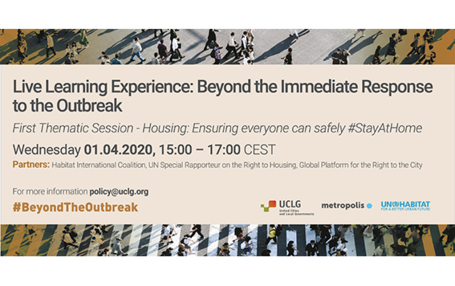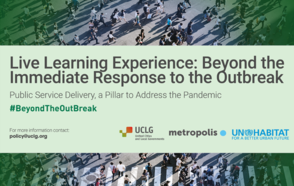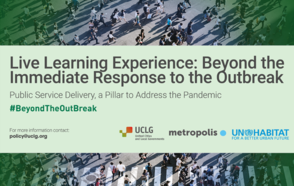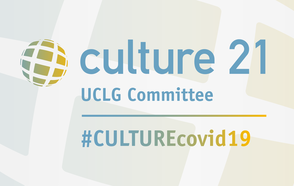
Nairobi, Barcelona, 2 April 2020 - The Live Learning Series hosted by UCLG, Metropolis, and UN Habitat, that began last week with local and regional governments sharing their experiences, initiatives, and actions to support their communities facing the pandemic is entering its second phase, focusing on specific public services.
The live learning session that took place on April 1 co-organized by the UCLG Committee on Social Inclusion, Participatory Democracy and Human Rights brought together local, regional, and regional governments, partners from the civil society and the United Nations to address the housing crisis, and the measures that contribute towards successful #StayAtHome policies.
The Vice-Minister of Housing of Costa Rica, Mayors from Grigny, Bukavu, Deputy Mayors of Barcelona, Cocody and representatives from Bogota, Montevideo, Montreal, Vienna, Guangzhou, Itzapalapa, Xi’an and the region of Catalonia were joined by the UN-Habitat Executive Director, the UN Special Rapporteur on the Right to Adequate Housing, the President of Habitat International Coalition, the UCLG Secretary General, and representation from the Global Platform on the Right to the City.
The meeting was opened by the UN-Habitat Executive Director, Maimunah Mohd Sharif, who said that the right to adequate housing was a universally recognized Human Right.
“Housing is also central in our battle against COVID. Without adequate housing, social distancing and hygiene, are simply impossible. Adequate housing is now a matter of life and death at this moment and in the future.,” she said
More than 200 participants gathered in for the online session structured around two Roundtables that looked at how, in many places, complying with the “Stay at home” measure could prove to be problematic due to lack of adequate housing or services.
The UN Special Rapporteur on the Right to Housing, Leilani Farha, highlighted some of the policies that have been carried out in cities from all over the world to ensure that everyone can stay at home to protect themselves during the pandemic, and the opportunities that the reaction to the COVID-19 crisis offers in regards to guaranteeing the right to housing for all.
“There should be no evictions of anyone, anywhere, for any reason. We can call that a logical extension of the #StayAtHome policy. We know protecting the most vulnerable and informal settlements residents can be done. This is all consistent with the right to housing,” said Ms Farha
Other Speakers emphasized that the learning experience on housing would prove to be useful to identify gaps in housing and service provision, and how local and regional governments are working on them.
The first of the roundtables, moderated by Adriana Allen, President of the Habitat International Coalition, highlighted the challenges of maintaining #StayAtHome policies, particularly in the global south. The Deputy Mayor of Cocody, Patricia Awa Ouassenan Nelly and Esperance Mwamikazi Baharnyi, Mayor of Bukavu highlighted the measures undertaken to support stay at home policies in the early stages of the pandemic, such as bringing medical assistance to the house. They emphasized the importance of safe and secure food circuits to ensure that communities have equal access to healthy and sustainable food to stop the spread of the pandemic. The Mayor of Grigny, Philippe Rio highlighted how the COVID-19 outbreak is amplifying inequalities, exposing not only the most vulnerable populations but also the most vulnerable territories. Local and regional governments have a key role in those territories to ensure the safety of their inhabitants, he said.
The role that local and regional governments can play in ensuring that these policies are maintained and mainstreamed was the focus of the second roundtable, moderated by Lorena Zárate, from the Global Platform on the Right to the City. Cities that are currently at the heart of the outbreak, such as Barcelona, represented by the Deputy Mayor Laia Bonet or Vienna, laid out measures taken by local governments to ensure that housing does not contribute to the anxiety generated by the pandemic. Housing provision for “invisibilized” populations and people with disabilities were some of the challenges addressed in the session, as was the role that staying at home plays for women, and children, who are more at risk of domestic violence.
The final part of the experience saw participants engaging in an exercise to imagine housing policies in the aftermath of the pandemic, and what can be done to bring forward the lessons learnt. Participants from Xi’an and Guangzhou, provided the viewpoint of cities that were in the aftermath of the pandemic, and the importance of providing support to vulnerable populations during and beyond crises, and how mobilizing and protecting public servants was essential to guaranteeing that communities could be resilient in the process of reconstruction.
Emilia Saiz, Secretary General of UCLG, concluded the session by highlighting what adequate housing will mean in the aftermath of the pandemic and what measures need to be taken to ensure access to housing in times of economic and social uncertainty. She called for enhancing dialogue among various spheres of government to carry out a multilevel approach to the housing crisis, during and beyond the COVID-19 outbreak.
This was the first of the live learning sessions to address a specific key issue related to the pandemic. The live learning sessions will continue with weekly sessions on Wednesdays during the crisis. Mobility, access to technology in service delivery during the current crisis and the role of Local Governments’ Associations will be among the topics covered as cities around the world are already looking at how to overcome challenges with a new generation of solutions.
- Download the full press release
- Visit the #BeyondTheOutbreak page
- Visit the CitiesForGlobalHealth platform













